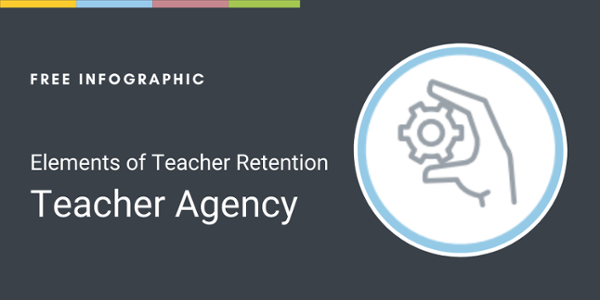
what does teacher agency look like in a school?
one of the beautiful things about having a career in education is that you have something in common with everyone. no matter where you go, you will find someone who went to school or has a relative in school, and in many parts of the country, the school district is one of the largest employers in the region. recently, i sat next to a friendly salesperson from western new york on a flight that was thrice-delayed. we joked about not turning our phones to airplane mode until we were wheels-up, lest we tempt fate and delay the flight again, then we started chatting about our reasons for traveling.
it turns out that my seatmate came from a family of educators, and he shared a story about his father’s decision to retire early that struck me as both tragic and telling. his father was a teacher and coach, and he was in the same school long enough to teach two generations in many families. coach’s experience over the course of his career was that his accountabilities increased, but his ownership decreased. stated another way, he noticed that he was being held responsible for a list of things over which he had no influence. this lack of teacher agency is among the causes of a worrisome flight from teaching as a profession – in 2016, 55% percent of the teachers who chose to leave the profession cited job dissatisfaction as the reason they left, according to the learning policy institute, and a recent gallup study identified a lack of potential for career advancement and professional growth as the most common job-related factor that caused teachers to voluntarily leave the classroom.
teacher agency, defined by learning forward as, “the capacity of teachers to act purposefully and constructively to direct their professional growth and contribute to the growth of their colleagues,” is one of the eight design elements we believe school systems should consider as they address teacher retention in their schools. on a tactical level, districts addressing teacher agency need to build systems that empower teachers to be decision-makers and innovators, which is an easy thing to embrace in theory, but a more difficult thing to execute.
when considering where to start, think of the ways in which you empower teachers at the systems level, give teachers a role in making decisions at different levels, and teachers’ ability to innovate.
systems: teachers co-design, implement, and adjust processes that drive classroom and school operations.
consider creating opportunities for teachers to lead on questions of classroom policy, academics, and culture. giving teachers a voice in school operations empowers them, and introduces new student-centered perspectives to conversations that have historically operated separately from that sphere. this might look like adopting practices to clearly define roles and accountabilities on grade or subject level teams, or inviting teachers to join project teams to address operational issues.
decision-making: teachers make meaningful decisions about how their classrooms and school are run.
one of the key components of teacher efficacy is the establishment of a culture in which teachers are empowered to make decisions in their spheres of influence. this relates directly to the reality coach decided to leave behind – he did not have any decisions that belonged to him, but was a conduit and communicator between administrators and students whose perspectives were not in alignment. as you approach decision-making, try using protocols to make shifts in your team meetings to ensure all participants have a role and a voice, use their input to drive decision-making, and follow up with teachers if you did not follow their advice and explain why.
innovation: a culture of risk-taking built on psychological safety and dedicated resources to enable experimentation and learning helps to drive innovation.
teachers are told to support students’ creativity, communication, collaboration, and problem-solving, but are often expected to teach a boxed curriculum and administer (and be evaluated by) standardized tests. to support innovation by teachers, consider starting by facilitating ghost walks and learning walks so teachers can see examples of innovative practices, or using design challenges to encourage out-of-the-box thinking and solutions design in a low-risk environment.
if educational institutions can shift their practices to support and strengthen teacher agency, they will go a long way toward addressing one of the key reasons teachers choose to leave the classroom. we should all be working to support teachers like coach in schools today, in the hopes that they remain in schools to add value to the educational experiences of their students and colleagues and enjoy the knowledge that their contributions are valued.
check out our free one-pager with quick tips and strategies for promoting teacher agency in your schools!
about megan campion
megan campion is a partner at 瑞士vs喀麦隆亚盘赔率 . megan has extensive experience working in schools as a teacher and administrator, and with schools as a program manager and consultant. megan began her teaching career as a kindergarten teacher at an independent school in mclean, virginia. she transitioned into teaching middle school history in her second year of teaching, and spent her time as a teacher creating student-centered, inquiry-based learning experiences for students. megan’s career in education has been centered around the question of what is effective, scalable, and measurable in education, and supporting the development and engagement of all stakeholders in a school community.


